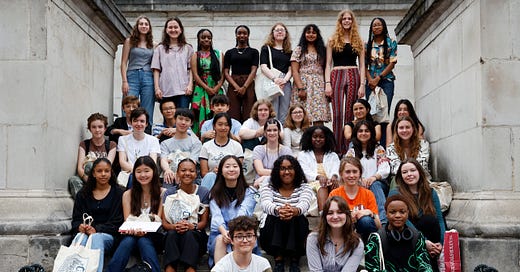Conversations with The Orwell Youth Fellows
Hear from the past winners and runners up of Rhe Orwell Youth Prize...
We asked previous winners and runners up of The Orwell Youth Prize to interview the 2023 cohort about their winning writing. Scroll down to read - and listen to - some highlights from these conversations…
You can read the interviews in full on our website.
Below, 2021 winner, Bella Rew, interviews 2023 winner, Lara Wong, about their poem ‘Men’s Shoes’:
Bella: Everyday things like shoes and hair might seem like an odd topic for political writing. Do you have any thoughts on the overlap between the political and the personal?
Lara: It’s strange how simple objects like shoes can become so entangled in society’s expectations around gender. It was partially frustration that propelled me to write the poem, when some choices in self-expression began to carry more weight. There is simultaneously the pressure of social norms on everyday choices as well as the consequential political power we have by making intentional decisions in personal matters.
2019 winner, Jessica Johnson, interviews 2023 winner, Beth Anker, about her essay ‘Meritocracy: The Politician’s Pipe Dream’:
Jess: What do you think about the future of education, especially considering some of the evidence that suggests mixed-ability teaching can improve overall attainment?
Beth: It’s clear our education system, which is full of division and disparity, will only reproduce inequality. If we look towards Finland as an example, by creating a ‘common’ school and working to abolish fee paying and selective schools, we can provide a better education system for every student. I think the reason a lot of parents are resistant to this change is because they believe that their child will be receiving a worse education just so others can receive a better one… Instead it is about levelling up comprehensive schooling until it is comparable to selective and fee paying schooling, which in some cases it is… The highest attaining students’ success should not have to depend on the lowest attaining students’ ‘failure’.
2022 runner up, James Lomax, interviews 2023 winner, Heike Ghandi, about her short story ‘The Catharsis of a Crane’:
James: The relationship you’ve chosen to explore here is that of a father and his daughter – why was this specific dynamic examined?
Heike: Personally, I find parent-child relationships interesting due to their multifaceted nature. On one hand, you have the limited view of the child that is at the mercy of the situation that they are placed in. On the other, you have the wider lens of the adult whose actions and choices are shaped by the lives they have lived and who they are. I think that by choosing the perspective of the father, I was able to explore the wider context of the story that wouldn’t be possible from the daughter’s view.

2020 runner-up, Noah Robinson, interviews 2023 runner-up, Heather Chapman, about her short story ‘Tableau with Sea Breeze and Salt Crown’:
Noah: As with the best political writing, its meaning is expertly disguised behind metaphor. Were there any particular themes or present issues that motivated you to write the piece?
Heather: I think I was broadly interested in issues surrounding the environment, and how questions of power and corruption are wrapped up in climate change. I was also interested in exploring the theatrical side of politics: often current events feel so wrapped up in performance and artifice, so I thought it would be interesting to represent this literally through a theatre performance.

2020 winner, Hugh Ludford, interviews 2023 runner-up, Ruxue Jia, about her short story, ‘Why is it so dark?’:
Hugh: Do you have any writing process tips for other young people?
Ruxue: For me, it was a relatively difficult process to settle on one topic. Initially, I had multiple ideas that all seemed wonderful to write about. If that is you, I suggest you try planning and writing one paragraph for each topic. Eventually, you would realise some of the themes may not be for you, for example, it can feel difficult to continue the story, or almost boring to write about; similarly, some topics you would find a true joy in writing about, which is then what you should carry on with.
Below, we have an audio recording of 2021 winner, Anya Poerscout-Edgerton, in conversation with 2023 winner, Amelia Roles. They discuss their Orwell Youth Prize winning pieces ‘A Small Thing’ and ‘Misconception’, as well as Anya’s satirical podcast for the Orwell Youth Fellows’ Substack project, The Digitalis Archives.
Extract from the interview below:
Amelia: Make sure that the subject you write about isn't something you've been forced into writing about, because it's just not going to be the same. Because I remember there were a lot of people who entered it at the same time as me. And I could tell they didn't really care about what they were writing about. Whereas I cared about what I was writing about. I think that's what makes the difference between a very monotone piece of writing and a piece of writing where you can tell the person's obviously deeply invested in the subject matter.
Anya: My advice, I think my advice is almost like to younger me entering the prize, which sounds so gross, but still! Don't be afraid of being pretentious, I think, because people like you can definitely do writing and having opinions, whether that's because you're female or whatever else. And also, I think that people who are pretentious are usually people who are ungenuine, so if you're genuine, and you really care about a thing and are passionate about a thing, and you really want to write about it, I don't think there's really that much of a risk of being pretentious. Just go for it. Go for it. Just do it.




